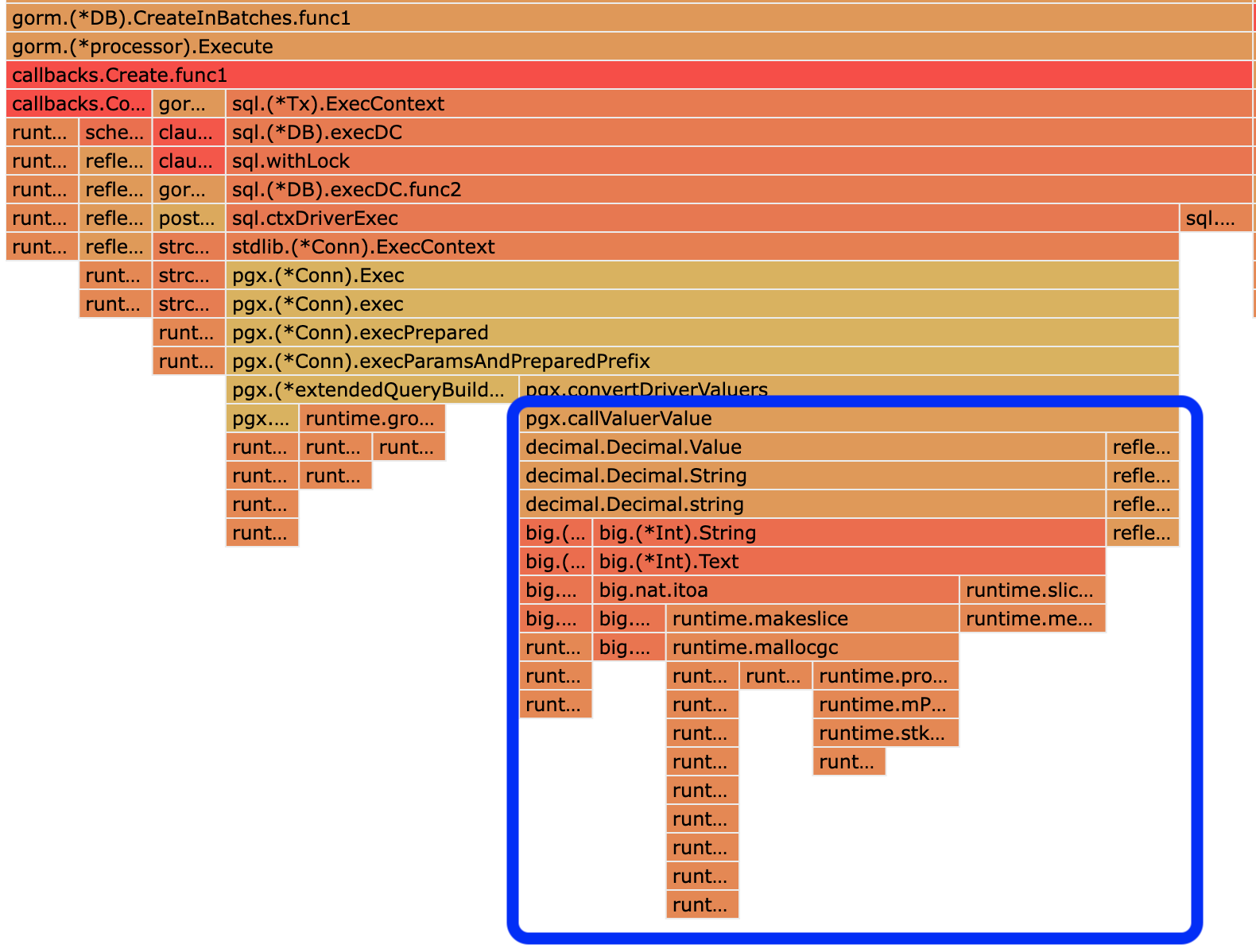Similar and compatible with decimal.Decimal, but optimized for Alpaca's data sets.
- optimize for Alpaca data sets (99% of decimals are within 10 millions with up to 12 precisions).
- compatible with decimal.Decimal so that it could be a drop-in replacement for current
decimal.Decimalusage.
The original decimal.Decimal package has bottleneck on big.Int operations, e.g. sql serialization / deserialization, addition, multiplication etc. These operations took fair amount cpu and memory during
our profiling / monitoring.
The optimization this library is to represent most decimal numbers with int64 instead of big.Int. To
keep this library to be compatible with original decimal.Decimal package, we use original as a fallback
solution when int64 is not enough (e.g. number is too big / small, too many precisions).
The core data struct is like following:
type Decimal struct {
// represent decimal with 12 precision, 1.23 will have `fixed = 1_230_000_000_000`
// max support decimal is 9_223_372.000_000_000_000
// min support decimal is -9_223_372.000_000_000_000
fixed int64
// fallback to original decimal.Decimal if necessary
fallback *decimal.Decimal
}We pick 12 precisions because it could cover 99% of Alpaca common cases.
In general, alpacadecimal.Decimal is fully compatible with decimal.Decimal package, as decimal.Decimal is used as
a fallback solution for overflow cases.
There are a few special cases / APIs that alpacadecimal.Decimal behaves different from decimal.Decimal (behaviour is still
correct / valid, just different). Affected APIs:
Decimal.Exponent()Decimal.Coefficient()Decimal.CoefficientInt64()Decimal.NumDigits()
For optimized case, alpacadecimal.Decimal always assume that exponent is 12, which results in a valid but different decimal representation. For example,
x := alpacadecimal.NewFromInt(123)
require.Equal(t, int32(-12), x.Exponent())
require.Equal(t, "123000000000000", x.Coefficient().String())
require.Equal(t, int64(123000000000000), x.CoefficientInt64())
require.Equal(t, 15, x.NumDigits())
y := decimal.NewFromInt(123)
require.Equal(t, int32(0), y.Exponent())
require.Equal(t, "123", y.Coefficient().String())
require.Equal(t, int64(123), y.CoefficientInt64())
require.Equal(t, 3, y.NumDigits())big.NewIntoptimization from here might help to speed up somebig.Intrelated operations.big.Int.Stringslowness is tracked by this issue. The approach we reduce this slowness is to use int64 to represent the number if possible to avoidbig.Intoperations.
Generally, for general case (99%), the speedup varies from 5x to 100x.
$ make bench
go test -bench=. --cpuprofile profile.out --memprofile memprofile.out
goos: darwin
goarch: amd64
pkg: github.com/alpacahq/alpacadecimal
cpu: Intel(R) Core(TM) i9-9880H CPU @ 2.30GHz
BenchmarkValue/alpacadecimal.Decimal_Cached_Case-16 314870084 3.498 ns/op
BenchmarkValue/alpacadecimal.Decimal_Optimized_Case-16 15383466 70.27 ns/op
BenchmarkValue/alpacadecimal.Decimal_Fallback_Case-16 5603755 209.2 ns/op
BenchmarkValue/decimal.Decimal-16 6167956 184.5 ns/op
BenchmarkValue/eric.Decimal-16 7021383 162.2 ns/op
BenchmarkAdd/alpacadecimal.Decimal-16 556380649 2.132 ns/op
BenchmarkAdd/decimal.Decimal-16 15557970 68.31 ns/op
BenchmarkAdd/eric.Decimal-16 27423730 40.34 ns/op
BenchmarkSub/alpacadecimal.Decimal-16 268269063 4.410 ns/op
BenchmarkSub/decimal.Decimal-16 17239782 59.17 ns/op
BenchmarkSub/eric.Decimal-16 24690660 40.81 ns/op
BenchmarkScan/alpacadecimal.Decimal-16 87226915 13.46 ns/op
BenchmarkScan/decimal.Decimal-16 6075110 191.1 ns/op
BenchmarkScan/eric.Decimal-16 6422792 174.4 ns/op
BenchmarkMul/alpacadecimal.Decimal-16 168732728 7.176 ns/op
BenchmarkMul/decimal.Decimal-16 16051546 66.57 ns/op
BenchmarkMul/eric.Decimal-16 39927952 28.20 ns/op
BenchmarkDiv/alpacadecimal.Decimal-16 152054401 7.772 ns/op
BenchmarkDiv/decimal.Decimal-16 4098888 281.7 ns/op
BenchmarkDiv/eric.Decimal-16 34245668 31.42 ns/op
BenchmarkString/alpacadecimal.Decimal-16 385985688 3.032 ns/op
BenchmarkString/decimal.Decimal-16 7750777 150.9 ns/op
BenchmarkString/eric.Decimal-16 6694531 167.0 ns/op
BenchmarkRound/alpacadecimal.Decimal-16 88814521 11.92 ns/op
BenchmarkRound/decimal.Decimal-16 4333029 255.7 ns/op
BenchmarkRound/eric.Decimal-16 55717095 21.34 ns/op
PASS
ok github.com/alpacahq/alpacadecimal 37.671s
